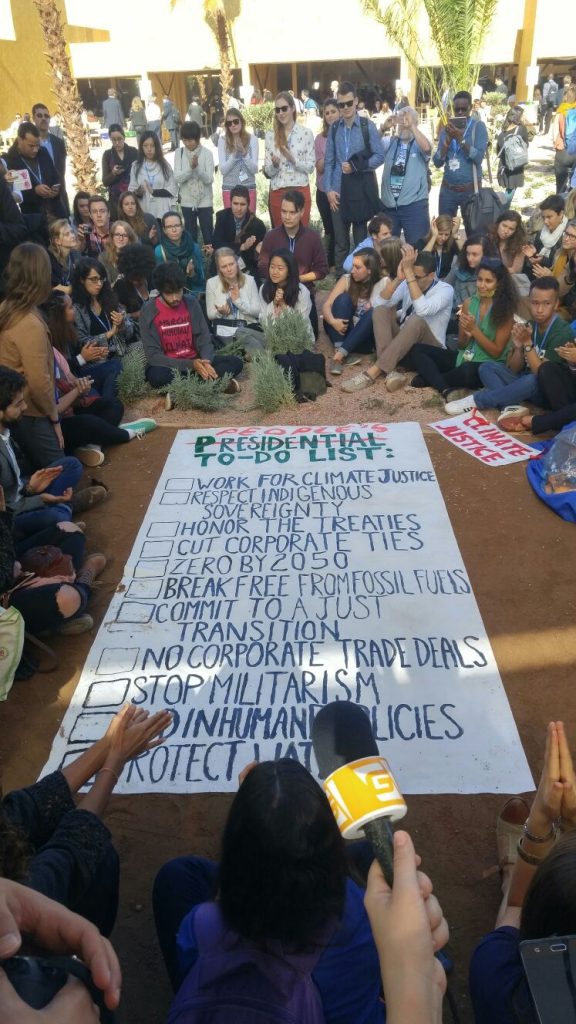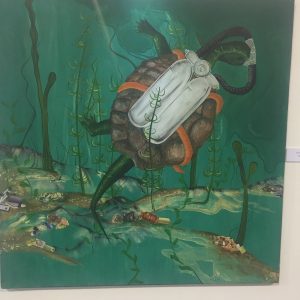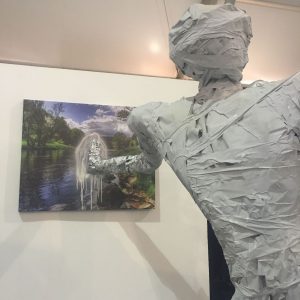We’re a bit delayed on this update, but yesterday was nowhere near normal at the COP or at home, so I’m sure you can understand & forgive.
We woke up in the Riad to the news of the outcome of the US election, quite shocked (as I’m sure many of you were at home). Without getting political, this outcome has severe impacts on the United States’ climate change policy going forward, and the shockwaves reverberated throughout the COP. The tone was somber, with the YOUNGOs leading a moving demonstration emphasizing how the shift in focus for climate change advocates must now move to the people. It’s still very unclear what the long-term impacts of this will be for the UNFCCC and the Paris Agreement. Negotiations continued yesterday as did the various side events planned. I was shocked at how little anyone mentioned the election in official events and negotiations, but it absolutely dominated every informal conversation. In the negotiations themselves, the US took a step back, making a short statement about their desire for a strong effort and agreement over the next two weeks but otherwise keeping quiet the rest of the day. We have heard that the US negotiators are on lockdown as well, not able to speak to anyone outside of the delegation or go anywhere besides the COP and their hotel rooms until an official position can be formed (bad news for the various meetings with US delegates I had planned for this week!).
On the brighter side, a strong sense of community seems to be forming here at the COP. Everyone is very supportive, concerned, but resilient. Three of us were able to join a group of over 60 other students and faculty from universities around the world at a get-together of Young RINGOs (Research and Independent NGOs) hosted by Vermont Law School and Washington University at their Riad (Moroccan apartment) last night. It was a wonderful chance to get to know all the other students here at the COP doing similar work that we are doing. We were also able to bolster each other up and be reminded that no matter what happens in Washington, there are still so many motivated and brilliant young people dedicated to making sure climate change never falls off the agenda.
Below are our student updates for Day 3 – despite the setbacks, we are still doing incredible things!

YOUNGOs lead a demonstration motivating the work that needs to shift to sub-national, private and individual levels
Delfina: My day started at the BINGO (Business and Industry NGOs) meeting where the updates on business and COP negations of day 2 were addressed. Following that, I spend the rest of the morning with some representatives of COICA, the Peruvian organization that represents indigenous communities in the Amazon Basin. I performed multiple interviews, which where later derived to my client.
After mid day, I attended a side event in the EU pavilion that talked about Global Supply chain transparency and how to harness the power of data for deforestation free economy. The conversation mainly talked about unlocking supply chain data to reduce deforestation through a new online platform under the TRASE Initiative which will be publicly launched this Friday.
I also attended a very interesting side event in the Brazil pavilion that touched on ways to engage the corporate and financial sector into quantifying ecosystem services into their business strategy. It was a great presentation and I look forward to some more side events they will be hosting on similar topics. I ended my day at the AILAC office where I performed some more interviews to LatAm negotiators as well as helping to plan a small media conference panel that will be held tomorrow with some Latin negotiators and their take on the first couple of days of at the COP.
Jade: Today started out on a shocking and disheartening note for me, as I’m sure it did for many. However, business as (more or less) usual continued at the COP and we all pushed on with our days. Today was Farmer’s Day – a key day for my focus area of agriculture. I attended many side events dealing with different facets of agriculture – ranging from large scale commercial agriculture to indigenous and smallholder agriculture. It’s eye-opening to see the diversity of issues within this topic and perhaps easier to see why work on agriculture has been so difficult in these negotiations. I found the events on indigenous peoples to be particularly thought-provoking. The idea of private sector involvement was rejected in these events and smallholder action and conservation was celebrated.

Megan:
Today we woke up to the tragic results of yesterday’s election and the knowledge that we would now have to literally go face the world as a members of a country that feels it’s ok to promote misogyny and racism, to mock the disabled, to spread intolerance and most relevantly here, to move backwards on so many issues, including climate change. As Trump has announced during the election his plans to “cancel the Paris climate agreement and stop all payments of US tax dollars to UN global warming programs”, there is serious concern for what that means for COP and climate negotiations going forward.
Nevertheless, the world keeps going and, although there is a sense of shock here, so does the COP. I started off the morning with the RINGO meeting to get some updates on yesterday’s major meetings. Next caught a bit of an event on changing oceans and seas put on by the EU before heading off to the daily update meeting with Climate Analytics. Most of the team is from Germany or Africa, but there was also a member of the Seychelles delegation present today. They all continued to hold on to optimism about the outcomes of the Paris Agreement despite this new turn of events which was encouraging to hear, particularly after attending yesterday’s talk on equity which confirmed that international agreements with fair effort sharing are more likely to be agreed upon and successfully implemented.
In the afternoon, I attended an event on sustainable development goal 14, related to oceans and science based solutions for adaptation and mitigation in the oceans. As is emerging as a theme in all of the oceans meetings I have attended, there is a push to include oceans directly in the UNFCCC as they are only specifically addressed by certain countries, often the most vulnerable, and a bit neglected by annex 1 states. Following this, I made my way over to the Green Zone for the first time to check it out. Endlessly during this week, I have wished that I would have kept up with my French better and never more so than in the Green Zone where communication and events occur primarily in that language. Despite not understanding everything, it was enjoyable to walk around seeing all the booths, and I even found an art exhibit which I spent some time exploring. Heading over to young RINGO event soon to cap off another busy day here in Marrakech.


Tanya:
Today was a difficult day. After waking to the news of President-elect Trump, I found the COP venue and participants a little less invigorated than the previous couple of days – maybe it was just me! Through the first half, we found ourselves breaking into smaller groups to discuss the results – with fellow students from the states, Prof. Tracy Bach from Vermont Law, even joining an impromptu circle started by indigenous org activists calling for solidarity – and wondered what the results would mean for climate change, in as much shock as everyone back in America.
In the afternoon, I attended one of the first AOSIS consultations open to observers on mitigation, where they discussed the features of NDCs and what they considered essential to these submissions. I followed this up with meeting with my client (IUCN) and discussing the work plan for three events, planned on Thursday and Saturday this week. I then attended a side event on how water resources and cultural heritage tie together, and the importance of bringing youth on board to protect and conserve our natural and cultural heritage. We rounded out the day by heading to the Young RINGOs informal breakout at our host’s nearby riad, where we met students, researchers and faculty attending COP this year, and learned about their specific areas of interest within climate change.